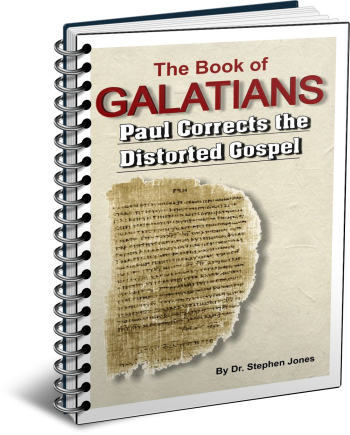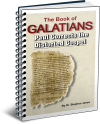Latest Posts
View the latest posts in an easy-to-read list format, with filtering options.

This is a verse-by-verse commentary on Paul's epistle to the Galatians, which was written to combat those Jewish Christians who were unable to leave the Old Covenant and adhere to the New Covenant. In their attempt to add the New Covenant to the Old, and to add Jesus to the temple system of animal sacrifices and other rituals, they had distorted the gospel.
Category - Bible Commentaries

Paul finds it necessary to set forth his credentials as a genuine apostle in the first verse of Galatians. He does this because the Judaizing opposition has tried to discredit him on the grounds that he was not one of the original apostles who had walked with Jesus. To them, Paul's beliefs held less authority than those of the “genuine” apostles.
Of course, their argument was somewhat lame, because James was not one of Jesus' disciples either. James, the head of the Jerusalem Church, was Jesus' brother after the flesh, but he was not the disciple by that name. The disciple himself had been martyred in Jerusalem (Acts 12:2) after returning from a mission trip to Spain in 44 A.D. Up to that time, there had been no single leader of the Church in Jerusalem.
It is significant also that while Jesus ministered on earth, his brothers (including James) did not believe in Him (as the Messiah). John 7:5 says, “For not even His brethren were believing in Him.” James' conversion came after His resurrection proved that He was the Messiah. So James himself was not one of the original apostles, and he only became a believer a few months before Paul himself.
The word apostle means “one who is sent.” The implication is that an apostle is sent or commissioned by God. So Paul writes in the first verse,
1 Paul, an apostle (not sent from men, nor through the agency of man, but through Jesus Christ, and God the Father, who raised Him from the dead).
Paul's commission was first revealed to Ananias in Acts 9:15, 16,
15 But the Lord said to him, “Go, for he [Saul/Paul] is a chosen instrument of mine, to bear My name before the Gentiles and kings and the sons of Israel; 16 for I will show him how much he must suffer for My name's sake.”
After Paul's conversion, he spent three years in Arabia (Gal. 1:17), no doubt contemplating the law and the distinction between the covenants. He received a fresh revelation there, with no man teaching him, for there is little doubt that he had gone to Mount Sinai in Arabia (Gal. 4:25) and had sat in the cave where Moses and Elijah had prayed.
After three years he returned and went to Jerusalem, where he met with Peter to learn more details of the life of Jesus. He went to the temple, where he then received a further vision. Paul told the story in Acts 22:17-21, saying,
17 And it came about when I returned to Jerusalem and was praying in the temple, that I fell into a trance, 18 and I saw Him saying to me, “Make haste, and get out of Jerusalem quickly, because they will not accept your testimony about Me.” . . . 21 And He said to me, “Go! For I will send you far away to the Gentiles.”
The Greek word for “send you” in verse 21 is exapostello, from which is derived the word apostle.
So the revelation of Paul's apostleship came first to Ananias, then three years later to Paul himself while he was praying in the temple in Jerusalem. Finally, this was witnessed by the prophets and teachers in Antioch. Acts 13:1-4 says,
1 Now there were at Antioch, in the church that was there, prophets and teachers: Barnabas and Simeon who was called Niger, and Lucius of Cyrene, and Manaen who had been brought up with Herod the tetrarch, and Saul. 2 And while they were ministering to the Lord and fasting, the Holy Spirit said, “Set apart for Me Barnabas and Saul for the work to which I have called them.” 3 Then, when they had fasted and prayed and laid their hands on them, they sent them away. 4 So, being sent out by the Holy Spirit, they went down to Seleucia and from there they sailed to Cyprus.
Thus, Paul was an apostle, sent by the Holy Spirit and witnessed three times: by Ananias, by Paul himself, and by the prophets and teachers of Antioch. These are Paul's credentials against those who were attempting to undermine his authority as an apostle in order to discredit his teaching on the New Covenant and the equality of all believers.
Paul's salutation takes up just five verses in the first chapter of Galatians. Then he immediately dives into his main course of teaching:
6 I am amazed that you are so quickly deserting Him who called you by the grace of Christ, for a different gospel; 7 which is not really another; only there are some who are disturbing you, and want to distort the gospel of Christ.
This is no side issue for Paul. To distort the gospel is to desert Christ Himself. One cannot be justified by the Old Covenant. Anyone who claims justification through the Old Covenant has distorted the gospel and actually comes under the curse of the law, Paul says in the next verses:
8 But even though we, or an angel from heaven, should preach to you a gospel contrary to that which we have preached to you, let him be accursed. 9 As we have said before, so I say again now, if any man is preaching to you a gospel contrary to that which you received, let him be accursed.
The Old Covenant method of justification says in Deut. 28:1-14, “If you obey, then I will bless you” (with the blessings of salvation or justification). Conversely, it says in Deut. 28:15,
15 But it shall come about, if you will not obey the Lord God to observe to do all His commandments and His statutes with which I charge you today, that all these curses shall come upon you and overtake you.
The problem is that all have sinned and fall short of the glory of God (Rom. 3:23). Further, “there is none righteous, not even one” (Rom. 3:10). For this reason, Paul says in Rom. 3:19,
19 Now we know that whatever the Law says, it speaks to those who are under the Law, that every mouth may be closed, and all the world may become accountable to God.
In other words, the whole world is under the Law—that is, under the sentence of the law due to sin. The Law holds the entire world accountable for their sin. The Law can save only the righteous, but there are no righteous men to save, for all have sinned. The Law can only condemn and “curse” them for their sin.
And so there must be another way of justification. The Old Covenant can save only men who are perfectly obedient, numbering around zero, because it is based upon man's vow of obedience and his ability to fulfill his vow perfectly.
The New Covenant, on the other hand, is based upon the ability of Jesus Christ to fulfill the Law perfectly. He was the spotless Lamb, the only One who was not condemned by the Law for any sin of His own. By faith, we covenant with Him and receive His righteousness imputed to us as if it were our own.
These two Covenants represent two paths to salvation. The one is based upon man's works and ability to obey; the second is based upon Christ's work and His ability to obey. The first covenant came up empty-handed, for it could only bring a curse upon the disobedient. The second is the only way that any man can be blessed and saved, whether he lived before or after the cross.
And so Paul tells us that the distorted gospel coming from the Judaizers can result only in the curse of the Law. Those who depend upon the Old Covenant for their salvation cannot be saved by it. The distortion comes when these people claim Jesus Christ, but yet retain the Old Covenant as their means of salvation. Such people stand somewhere between Judaism and Christianity, trying to merge the two as if the New Covenant were simply a new version of the Old Covenant.
This is the essential problem discussed in the rest of Paul’s epistle to the Galatians.
Jesus did not come to breathe new life into the Old Covenant and rename it the “New” Covenant.
No, the New Covenant, Hebrews 8:9 says, is an entirely different covenant that is “not like the covenant which I made with their fathers.” The Old Covenant was broken (Heb. 8:9) and went the way of all broken covenants. Heb. 8:13 (NASB) says,
13 When He said, “a new covenant,” He has made the first obsolete. But whatever is becoming obsolete and growing old is ready to disappear.
The Dispensationalist teachers of a century ago were notorious for teaching that the Jews were saved by the Old Covenant, while the “Gentiles” were saved by the New Covenant. Through such teaching, the distorted gospel was reborn in the modern world after its violent death in 70 A.D. The Old Covenant has saved NO ONE. Not ever. Not even Moses was saved by the Old Covenant, for Habakkuk 2:4 says, “the just shall live by faith.”
If the distorted gospel were true, then no one could have been saved prior to the cross, nor would it ever be possible for any Jew or Israelite to be saved, seeing that all have sinned and have broken the Old Covenant. Those who think that Jews are saved by the Old Covenant should ask themselves how the Apostle Paul was saved. He was of the tribe of Benjamin. Does anyone in their right mind believe that Paul preached one path of salvation to the Greeks but depended upon another path for himself? That would be sheer nonsense.
But fortunately for all of us, the Old Covenant was discarded and replaced by a New Covenant, one which made the salvation of the world not only possible but a certainty. Hebrews tells us that the New Covenant is built upon “better” foundations.